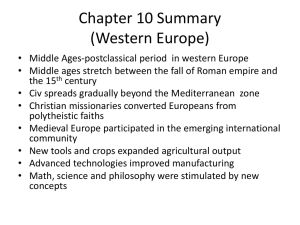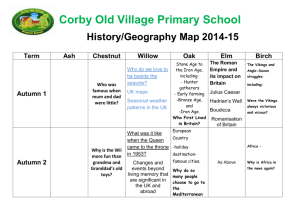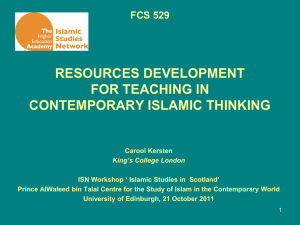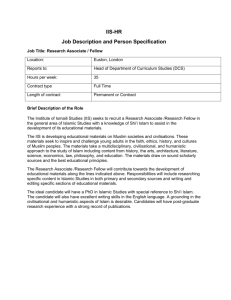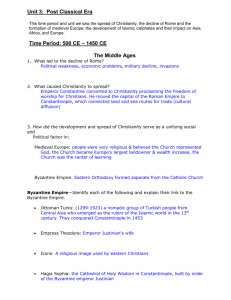18. HIST331 Early Islamic History
advertisement
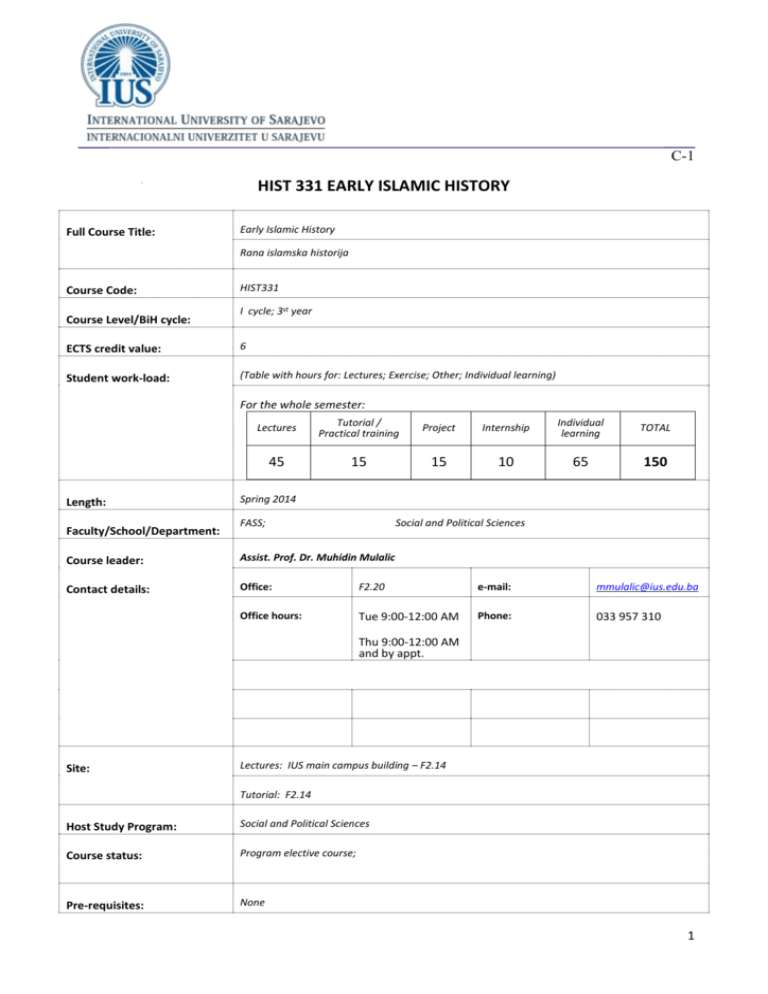
C-1 HIST 331 EARLY ISLAMIC HISTORY Full Course Title: Early Islamic History Rana islamska historija Course Code: Course Level/BiH cycle: HIST331 I cycle; 3st year ECTS credit value: 6 Student work-load: (Table with hours for: Lectures; Exercise; Other; Individual learning) For the whole semester: Length: Faculty/School/Department: Lectures Tutorial / Practical training Project Internship Individual learning TOTAL 45 15 15 10 65 150 Spring 2014 FASS; Social and Political Sciences Course leader: Assist. Prof. Dr. Muhidin Mulalic Contact details: Office: F2.20 e-mail: mmulalic@ius.edu.ba Office hours: Tue 9:00-12:00 AM Phone: 033 957 310 Thu 9:00-12:00 AM and by appt. Site: Lectures: IUS main campus building – F2.14 Tutorial: F2.14 Host Study Program: Social and Political Sciences Course status: Program elective course; Pre-requisites: None 1 C-1 Access restrictions: I cycle students only Assessment: Attendance, homework, quizzes, assignments, project, exams. Date validated: September 15, 2014 Course aims: Learning outcomes: Indicative syllabus content: Learning delivery: Assessment Rationale: Assessment Weighting: The aims of this course are to: 1. To develop students understanding of key historical terms and concepts 2. To introduce students to primary and secondary sources on the early Islamic history 3. To enable students to gain a chronological survey of main Islamic empires 4. To enriches student’s understanding of the major interactions between Jews, Christians and Muslims in the Middle East 5. To provide to students an idea of major contributions of Islamic civilization in arts, architecture, religion, culture and science. 6. To enable student’s understanding of political, economic, social, religious and cultural aspects of the Middle East 7. To ensure that students gain knowledge related to socio-political thought, administrative and intellectual developments during early Islamic historical period On successful completion of this course IUS student will be able to: 1. explain and use basic historical terms and concepts 2. explore main primary and secondary sources 3. use historical knowledge in understanding arts, architecture, religion, culture and science 4. develop historical, analytical and comparative skills 5. interpret the historical events and concepts This course will introduce students to socio-political, economic, historical and religious developments in the Middle East from the seventh to the early fifteenth century. This course will cover the following topics: ancient Middle East, Jewish, Christian and Persian history in the Middle East; Pre-Islamic Arabia; biography of the Prophet; rise and spreading of Islam; Islamic Caliphates; Islamic theology, mysticism, philosophy, science, arts and architecture; Islamic educational, political, social and economic institutions; the Crusades; Muslim Empires. This course employs a range of teaching and learning methods (lecturing, written assignments, presentations, peer presentation analyses, essays, group discussions, article, presentation/analysis). Students have two hours lectures and one hour practical training a week. Students are also expected to realise two different projects (to be arranged with professor). Learning will consist of knowledge acquisition and practical knowledge gained from the field trips and visits. Consultations and regular homework assignments will guide students’ individual learning and students’ progression in acquiring required knowledge and practice will be additionally checked through quizzes and midterm and final exams. In order to provide solid undergraduate foundation in Social and Political Sciences program and to enable students to develop a critical and evaluative understanding of history of world religions, students are expected to demonstrate commitment and diligence at any time whichever module they take, therefore appropriate assessment methods to help students to stay focused and active, and fully benefit from the Program include presentations, group activities, consultations, quizzes, exams and take-home exams. Presentation: 10% Paper: 20% Attendance: 10% Midterm: 20% Final exam: 40% 1. Chase F. Robinson, The New Cambridge History of Islam. Cambridge: University Press, 2010. Essential Reading: Recommended readings: Additional/recommended reading: 1. W. Montgomery Watt, The Influence of Islam on Medieval Europe. Edinburgh: University Press, 1972. 2 C-1 2. 3. 4. Ira M. Lapidus, A History of Islamic Societies, New York, 1988. Bernard Lewis, The Arabs in History, New York, 1961. J. L. Esposito, The Oxford History of Islam, New York, 1999. Intranet web reference: http://www.ius.edu.ba/Default.aspx?PageContentID=883&tabid=550 Important notes: Expected knowledge of: 1. Writing and communication ability 2. Basic knowledge related to Islamic history 3. Knowledge of basic socio-political, geographical and historical concepts related to Islam Course policies: Assignments: Each student should complete their assignment on time. Lateness in Assignments: The due date and time for each homework assignment will be specified on the assignment handout itself. Late submissions will be penalized. Academic Integrity: Any cheating on examinations or quizzes or offering the work of another as one's own in an assignment is regarded as a serious offence to the academic integrity. Important dates: Midterm exam: 6th week Final exam: 15th week Quality Assurance: Student surveys, discussion on course, student appeals, e-mails, direct (formal) feedback at the end of the semester by students, assistants and other colleagues Course schedule: 3 C-1 Week Lesson / Date 1 Topics to be covered Class activities Lab activities Introduction to the Course Lecturing No lab activities 1. Identify key terms and concepts. 2. Explain why study early Islamic history. 3. Describe and discuss theories, origin and approaches to study Islam 4. Introduce students to major works on Islam and Islamic civilization No lab activities Chase F. Robinson, geography and history in The New Cambridge the emergence of Islamic History of Islam. civilization Cambridge: 2. Present to students University Press, earlier ancient 2010. [pp. 17-152] Discussion and analysis of key terms and concepts Arabia and the Ancient Lecturing Empires in the Near East Video presentation 2 Group presentation Problems/ Assignments (Homework) Readings Learning objectives (After this lesson student will be able to:) 1. Explain the role of civilizations and empires 3. Discuss the relationship between ancient civilizations and Arabia 3 3 Socio-Cultural Dimensions of Pre-Islamic Arabia Lecturing Group presentation and discussion No lab activities 1. Explain the conditions in Chase F. Robinson, which Islam was born The New Cambridge 2. Present social, History of Islam. 4 C-1 Cambridge: University Press, 2010. [pp. 153-170] 4 Biography of the Prophet Lecturing Video The Rightly-Guided Caliphs and State-Building Lecturing 6 The Spreading of Islamic Culture and Civilization Lecturing 1. Explain key historical periods in Prophet’s biography 2. Present key historical works on the biography of Prophet No lab activities Chase F. Robinson, The New Cambridge History of Islam. Cambridge: University Press, 2010. [pp. 171-225] No lab activities Chase F. Robinson, The New Cambridge History of Islam. Cambridge: University Press, 2010. [171-225] No lab activities Chase F. Robinson, civilization spread so The New Cambridge rapidly History of Islam. 2. Present the role of Cambridge: Muslim mystics in University Press, spreading of Islam 2010. [pp. 226-359] Group debate 5 economic, religious, political, social and intellectual conditions of pre-Islamic Arabs 3. Analyze Arab pre-Islamic poetry and literature 1. Present main caliphs that succeeded the Prophet 2. Analyze main contributions of all four caliphs 3. Discuss main historical developments during this period 1. Discuss why Islamic 3. Analyze Islamic 5 C-1 encounter with ancient civilizations 7 Midterm examination and its preparation 8 Umayyad and Abbasid Dynasties Lecturing Mind-mapping Chase F. Robinson, The New Cambridge History of Islam. Cambridge: University Press, 2010. [pp. 305-394] No lab activities Chase F. Robinson, development s of The New Cambridge Crusades History of Islam. 2. Present causes and Cambridge: outcomes of Crusades University Press, 2010. [pp. 360-394] Group presentation 9 The Crusades Lecturing Video Group Discussion 1. Present dynastic developments in Islamic civilization 2. Discuss main historical developments and expansion of Islamic civilization during this period 3. Analyze golden age of Islamic civilization during this period No lab activities 1. Present historical 6 C-1 10 11 12 "Nomad Empires" in the Muslim World (1000-1500) Mongols Seljuks The Gunpowder Empires Ottoman Empire Safavid Empire Mughal Empire Islamic Contributions in Arts, Architecture and Sciences Lecturing No lab activities Bernard Lewis, The Arabs in History, New York, 1961. Lecturing No lab activities Bernard Lewis, The Arabs in History, New York, 1961. Lecturing No lab activities 1. Explain historical developments of nomadic empires 2. Present destructive role of Mongol invasion 1. Present in brief major Muslim empires 2. Discuss main contributions during this critical period 3. Analyze causes of fall of these Muslim empires W. Montgomery 1. Explain contributions of Watt, The Islamic civilization to Influence of mankind Islam on 2. Present key Muslim Medieval thinkers and scientists Europe. 3. Discuss the role of Edinburgh: Islamic sciences in the University Press, development of science 1972. [pp. 30and technology in the 7 C-1 40] Ira M. Lapidus, A History of Islamic Societies, New York, 1988. 13 Islamic Historiography, Literature and Philosophy Lecturing Class Debate Islamic Influence on Medieval Europe 14 and 15 No lab activities West W. Montgomery 1. Present Muslim Watt, The contributions in literature Influence of and philosophy Islam on 2. Identify key works on Medieval history, philosophy and Europe. literature Edinburgh: 3. Discus the Islamic University Press, influence on Medieval 1972. [pp. 72Europe 82] Ira M. Lapidus, A History of Islamic Societies, New York, 1988. Review Week and Final Examination 8
